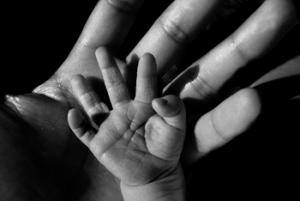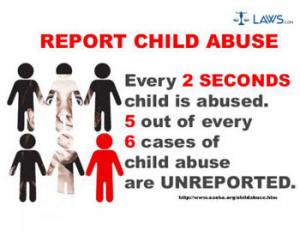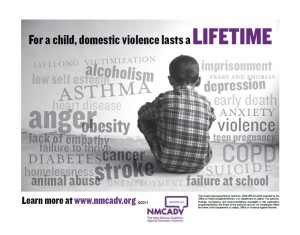
Rosa Parks Deserves More
April 15, 2014
Motherhood A Great Profession
May 15, 2014By Janice S. Ellis, Ph.D., Kansas City, MO –
Domestic violence hurts children, with the devastating and lasting impact going unnoticed and untreated until manifestations appear years later when the children become adults.
April is Child Abuse Prevention month. But everyday should be child abuse prevention day because abuse of children represents a kind of domestic violence all its own, and the resulting impact on children can often be far more devastating than that experienced by adults. This can be the case whether that child is a victim of that violence or a witness to such violence. Domestic violence hurts children.
We hear, all too often, about toddlers and teens dying at the hands of abusive or neglectful adults. The circumstances of these deaths transcend age, race and sex, both in terms of those who die and those who allegedly are responsible. Some children die as a result of physical trauma and abuse. Others die out of neglect, being left alone and consumed by fire, for example, while the adult was nowhere to be found.
Society has responded in many ways to address adult domestic violence. Battered women can find a refuge in shelters or some other transitional living arrangement. These shelters provide victims a safe environment and many forms of support until they can change their condition. Such support often saves their lives and changes their lives.
Domestic violence hurts children. Shouldn’t a dependent and helpless child have at least as many options as an adult to receive refuge from those who may be the perpetrator of harm? Shouldn’t we as a society expect the same kind of responsiveness and vigilance when it comes to protecting and keeping a child out of harm’s way?
Deaths of children in cities across the country paint a grim and alarming picture. These children, and other like them, suffered and died at the hands of adults. Yes, “the system” failed them in that they were, knowingly or unknowingly, exposed to family members and strangers who meant them harm. But as painful as it might be, we must acknowledge that more than “the system” failed some of these children.
Domestic violence hurts children and have devastating and lasting impact, often going unnoticed and untreated until manifestations appear years later when the children become adults. Photo Credit: teelahart.com
As family members, as neighbors, as a community, as a city – and definitely every childcare agency – we should ask what more could have been done to avoid these tragedies. And, more importantly, what efforts can be made to minimize if not prevent and stop abuse against children in the future?
We must keep the welfare of our children and youth constantly in view. We must keep their emotional and physical well-being very high on the radar screen.
When we hear the words domestic violence it must bring to mind more that the abuse suffered by adults at the hands of adults. It must also mean the abuse that our children suffer in their homes, their neighborhoods, their city at the hands of both family and friend, people they often have come to trust as well as the predatory stranger.
Is it well with my child or some other child I have encountered? Each of us needs to give that question serious thought. Pause and think about all the children you know. Can you really say all is well with them?
Are we really doing as much as we can to intervene in the lives and living conditions of our children who may be at risk? When in doubt, take action.
Children need vigilant adults looking after their well-being all the time. It is a full time job on the part of parents, teachers, church members, and neighbors – all members of the village. And when there are signs that their well-being is compromised or at risk, then efforts should be made to provide them a refuge, safe haven, support system just like adults – even more.
Domestic violence hurt children who witness it and who are a victim of it.
Feature Photo Credit: teelahart.com
Edited and Reprinted with Permission of USAonRace.com



10 Comments
I think this article is addressing a very real and relevant issue. How children are brought up when they’re young shapes who they are in the future. I think it would be beneficial to have seminars in schools for domestic abuse so that youth know what is and what isn’t acceptable behavior in their households. Moreover, seminars will notify students who they can call if they are in danger. Thanks for sharing. I hope this article reaches out to many more people.
Children are to be nurtured and loved. Excessive violence/abuse does not equate love, nor should it be seen as discipline. It only serves to destroy homes, and the children who may quite possibly grow up to be bitter and angry at the entire world for the suffering that they had endured.
They in turn would then pass it in to their children, repeating the endless brutal cycle. If we want our children to be better to themselves and to everyone around them, we must always show a good example and help them understand how to love, respect, and understand people by the way we treat them and others.
The individuals that children trust and look up to is the parents and adults in the society and when kids witness domestic violence it brings stress and confusion that no child should go through. The impact of domestic violence is so deep that it stays with a child till their adulthood.
I totally agree with you on this one. Domestic violence can not only inflict physical pain to the child but also to their mental health. Sometimes I can’t believe that there are these types of people. Thank you for the eye opening article.
Domestic violence is harmful. It can have a bad effect on kids.
when domestic violence happens we ignore the impact it creates to the life of children there.These statistics of trouble caused to the children is alarming.yes it is the system’s failure to address this issue.NGO’s and social organizations have a lot to do here
The issue of domestic violence and child abuse are matters that should not be taken lightly, as parents we are saddled with the highest of responsibility towards our children. It could be quite challenging balancing work and taking care of the children as a parent, but with the rate of child abuse, we should have a keen interest in the welfare of our children be it at school or at the hands of a family member.
I can totally relate to this because I’m kind of a victim. I often wonder why partners come together when they didn’t truly loved themselves enough and giving birth just to make the kids go through the trauma of their violence on one another. All hands must be on deck to fight this abuse against children.
As the saying goes ” THE BEST LESSONS are CAUGHT rather than TAUGHT. Same logic applies here. I mean if a child grows in violence he will not only have fears later on. Worst scenario is he might adapt it. Sadly, that is not the case now. Instead of teaching kids good values, they wake up to violence all around.
Who will take care of the children when their parents are violent? Domestic abuse is a big issue that needs to be addressed. The children suffer most in this very prevalent domestic problem.